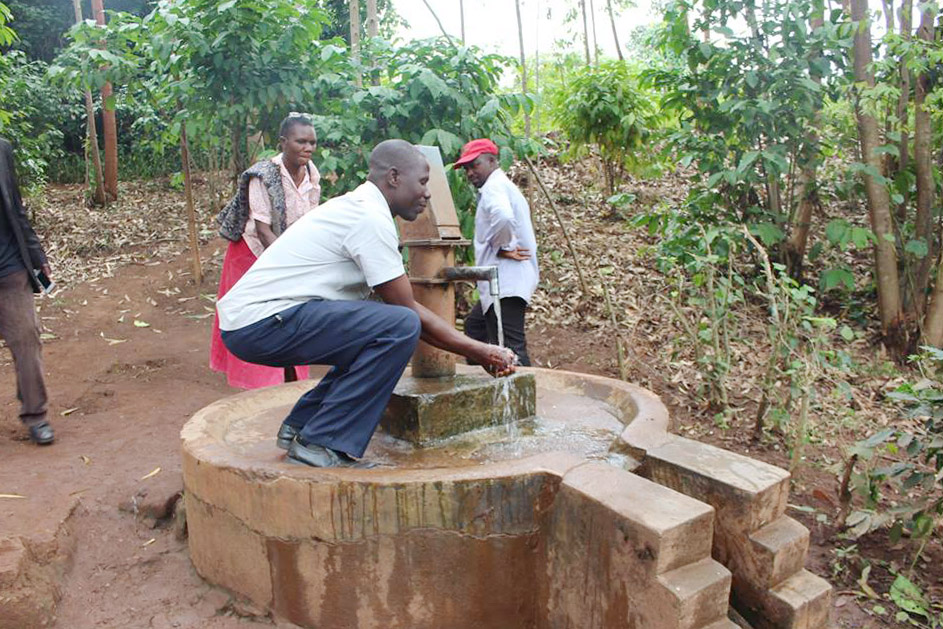Students intern in Uganda to grow a safer, cleaner environment

GlobeMed at UCLA helped fund the building of water sources like boreholes in the Nama sub-county in Uganda, providing villagers with clean water access. (Courtesy of GlobeMed at UCLA)
By Evolet Chiu
Sept. 22, 2016 9:09 p.m.
Students in a small Ugandan village jumped from their seats to greet Harveen Sekhon every time she entered the classroom.
Sekhon, a third-year human biology and society student, taught menstrual hygiene and sanitation practices this summer at Johnson Nkosi Memorial Primary School, where some members of the community are single mothers, orphans and children living with HIV and AIDS. Despite these obstacles, Sekhon said she saw her students make the best of what they had during her internship.
The Grassroots Onsite Work internship, or GROW, sent four interns this year from GlobeMed at UCLA to the Nama sub-county in Uganda.
Sekhon and three other interns taught hygiene and menstrual education, as part of the Water Access, Sanitation and Hygiene, or WASH, Project this summer. The WASH Project provides sanitation trainings to communities in Uganda. The group partnered with Mpoma Community HIV/AIDS Initiative, or MCHI, and fundraised around $11,000 to finance the trip.
[Related: UCLA GlobeMed strives to improve sexual health, education in Uganda]
For two months, GlobeMed interns taught twice a week at Johnson Nkosi Memorial Primary School in Entebbe, Sekhon said. They also surveyed people in their homes about their sanitation habits in the villages of the Nama sub-county, where 70 percent of diseases are water-borne related.
Claudia Flores, a GROW intern and fourth-year environmental science student, said they conducted 209 surveys asking about the cleanliness of households’ latrines and hand-washing stations, the proximity of their nearest water source, the frequency of their wash trainings and more. She also said they took the GPS points of the households they visited and created maps that linked their locations to the water sources that GlobeMed funded.
“Generally, the problem is access to water,” Flores said. “The government lacks funding to provide water access for a population that has doubled over the past 10 years.”
Flores added the project supplied water for schools and whole villages, which she said she thinks makes a big impact on the villagers’ sanitation practices.
“(The project) has helped a lot of people but we definitely need improvement on behavior change,” she said. “It’s understandable because most people there were never taught (proper sanitation practices) so they just don’t know, but (the) majority are willing to learn.”
Flores said this was GlobeMed at UCLA’s fourth year working with MCHI and their impact has reached nine villages in the county. The partnership between MCHI and UCLA’s GlobeMed chapter has funded a total of 10 boreholes, or water sources.
Caroline Fernandes, a fourth-year psychobiology student and GROW intern, said GROW started a project this summer that will provide the girls at the Johnson Nkosi Memorial Primary School with reusable sanitary pads. They also built washing stations where the girls could clean their pads individually and prevent the spread of infection. Flores said next year’s interns will evaluate if the project is successful.
“Since some of the girls are HIV positive, it’s really important to wash the pads so no infections spread and no one gets sick,” Fernandes said. “Every girl gets her own basin and hangs (the) pad from (a) clothing line in the station.”
Fernandes said the team is still trying to determine the best method to dispose of the pads, since openly burning them is harmful to the atmosphere and incinerators are expensive. However, she said she thinks the project could be very impactful if it is successful because it could prevent girls, who are embarrassed by their periods, from dropping out of school.
MCHI manager Peter Wandera said working with the GROW interns has allowed the non-governmental organization to assess the impact of their WASH program and fuel more innovative ways to improve community sanitation.
Wandera said they aim to provide communities with safe water systems within walking distance, and trainings to educate them about the importance of handwashing, latrine management and community empowerment.
He added the villages they have helped fund water sources for have already mobilized themselves to construct fences around their water sources to ensure safety and protection. Community involvement and awareness of sanitation have also increased after training, he said.
Fernandes said after coming back to California, she felt that topics discussed in everyday conversation were trivial compared to the challenges the Ugandan villagers faced daily.
“Life is so different there – simple and relaxed,” Fernandes said. “A sense of community is so important in Uganda.”
[Related: UCLA team travels to Uganda to treat patients with obstetric fistula]
She added that neighboring villagers were involved in each other’s lives and the community was very close.
“It’s a nice feeling (to know that) someone’s always got your back,” she said.
Wandera said now more than 6,000 people have direct access to clean and safe water, and incidences of water-borne diseases have decreased, according to village residents. He added the NGO has gained support from local village leaders, which will be important in resource and community mobilization for future programs.
“Water is life when it (is) safe,” Wandera said.
Fernandes added that GROW’s focus this year will be community empowerment and getting villages to take ownership of personal hygiene and water sources.


